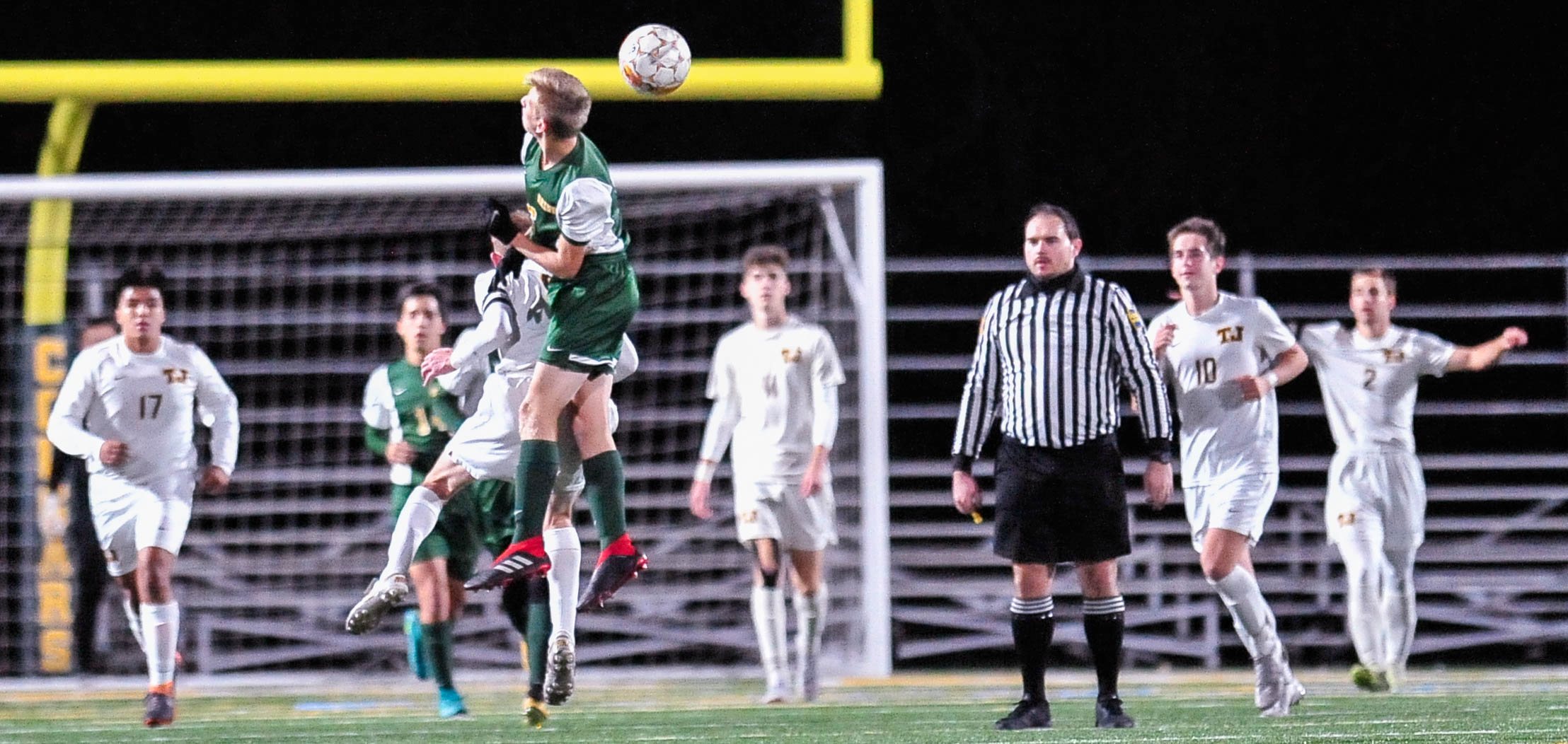
On a day when significant progress for soccer in Western Pennsylvania came in the form of a joint announcement by Pittsburgh Riverhounds SC and Allegheny Health Network/Highmark for a two-phase project to build new facilities in Coraopolis, the Pennsylvania Interscholastic Athletic Association (PIAA) Board of Directors turned down a proposal intended to align the high school game with the rest of the world.
Instead, they’re keeping things the way they are. As of now, the way things were established in 1999 is just fine with the PIAA Board.
The PIAA Board of Directors rejected a pilot proposal that would have transitioned the way high school soccer matches in the WPIAL would be officiated.
On the table was a proposal for PIAA to sanction a program in the WPIAL (District 7 – Southwestern PA), where the current ‘three whistle’ system used now in high school competition in Pennsylvania would would switch to system with one match official, and two lineman that’s used by most soccer organizations around the world.
Are changes coming to high school officiating? PIAA votes Wednesday on WPIAL’s pilot program
PIAA’s Executive Director Bob Lombardi justified the board’s rationale to reject this proposal to the Pittsburgh Tribune-Review shortly after the meeting concluded on Wednesday afternoon.
“In all my years here, we haven’t had a pilot program,” Lombardi said. “I think that sets up inconsistency and also sets up two tiers of standards for officiating. That’s not good.”
Creating inconsistency was the one, glaring hole in this otherwise well intended proposal that was brought to the PIAA Board, after the first hurdle has been cleared in June, when the PIAA Officials Council voted 15-6 to recommend the pilot program.
This begs the question: why wasn’t this proposal a collective state-wide initiative, but rather limited to the WPIAL?
What Lombardi is talking about, and what the PIAA board’s point of view would have resulted in having teams in the WPIAL having to play under one system during the regular season and WPIAL playoffs, but then switch back to having games officiated by the three-whistle system for the PIAA playoffs. Matches played between WPIAL and non-WPIAL teams would also would have needed to follow exisiting PIAA rules.
From that standpoint, this may actually be an understandable ruling. If change is going to come, the PIAA must have all sails in the right direction.
Lombardi’s additional justifications were a tad troubling. The PIAA boss actually tried to explain the benefits in the current system with three officials. With that kind of mindset, it might be a long time before the PIAA gets in line with the way the game is officiated everywhere else.
“Giving each person a whistle stopped the off-the-ball fouls and the behind-the-play fouls that in many cases were abusive or unsportsmanlike,” Lombardi said. “It cleaned up the game and highlighted the players’ skills. The better teams were winning instead of the team that became the most physical.”
Someone may need to give Lombardi a lesson in how the one-whistle system works.
There are still three officials on the field, and six eyes, and the way they’re positioned in that system, it’s is designed to provide each official with the best-possible positioning and ability make immediate calls and signals to ensure the whistle blown.
Significant abusive physical play or unsportsmanlike behavior is identified better with three whistles?
In fact, one of my biggest problems (of many) with the three-whistle system, is that often times, the officials are caught out of position because side officials often tuck inside the playing field serving as an addition referee, and not serving a more needed purpose — as a true linesman. This may be disputed by some current officials, but from my vantage point, it seems as if officials in these positions struggle to remain in proper position to make off side calls and balls going out along the sidelines and end lines.
Analysis: Flawed officiating system continues to plague HS soccer
Most share frustrations with HS officiating system to ‘get conversation started in meaningful way’
Lombardi further explained implementing these changes can’t be a snap decision, and the PIAA’s been using this system for more than two decades — and any changes would take significant implementation and referee education.
Fair enough, however, what’s wrong with trying to get in line with the rest of the country and the rest of the world?
At least the PIAA Officials Counsel, a state-wide panel of officials, voted by a 4 to 1 margin to recommend a trying this as a pilot program. They’ve identified that changes are needed.
Now, they’ll have to get the entire PIAA on board.
For the time being, instead of moving forward, the PIAA Board has chosen to remain using an outdated and flawed system.
“The double dual has been in existence for 20 years,” Lombardi noted, “and the board dropped support for the diagonal system 20 years ago. We have some things that we’d need to do procedurally to get that back adopted, if that were to be the direction.”
Based on reaction to past articles posted on Pittsburgh Soccer Now / Pittsburgh Soccer Report, consensus is that the system is sorely in need of change.
Hopefully the PIAA will do what’s needed to ‘get that back adopted’ — because that’s the direction that most everyone in the soccer community would want them to go.
LOOK FOR MORE REACTION HERE ON PITTSBURGH SOCCER NOW LATER THIS WEEK.
___________________________________________________________________________
More reaction on WPIAL Pilot Program Proposal / Rejection
The PIAA doesn’t put a bandage on the patient, they let them bleed out.
Does anyone know how many (high-end, DA-type) players opt out of high school soccer? Referees leave the HS game, then players leave the HS game, and then schools leave the game.
They need to do better. https://t.co/f96xUe6nsQ
— WPIAL Soccer (@wpialsoccerboys) July 17, 2019
Here's why i don't think it will happen anytime soon, as a PIAA soccer official a vast majority are older and can't center a boys high school game the entire match. This allows them to break it up and keep the same pay. I prefer to have a center and 2 lines myself.
— shep (@rsheppie) July 15, 2019
Such a poor choice. Why not officiate soccer like…just about everyone else in the world? The PIAA (and in turn the WPIAL) system has caused more problems for players, coaches, officials and fans than the widely accepted system ever has. Get with the times #PIAA !
— The Mick (@themick1966) July 18, 2019
A unified viewpoint has been echoed by every coach I’ve interviewed and spoken to, on, and off the record.
Some also took to share their feelings about the current situation on social media.
Of course. https://t.co/EQrggJtR7F
— Rob Eldridge (@Lions_CoachE) July 17, 2019
I don’t think any refs are out to get me or my teams, I just think the game itself would flow better if you had a true ref with two AR’s but I understand that may be difficult to do with lack of resources as well.
— Coach Miele (@BVABoysSoccer) July 15, 2019
There are clearly going to be logistical challenges, and a pilot program would have been a start though .
A shortage of certified officials is certainly one of them. Implementing these changes and as Lombardi mentioned, re-educating officials would provide a process.
In Alabama we use a 3-man system for all varsity games with a true center and two ARs. Our ref association does a phenomenal job of teaching/educating new officials with (usually) the more experienced ones being the head for our larger games
— Will Patridge (@WPatridge) July 16, 2019




















